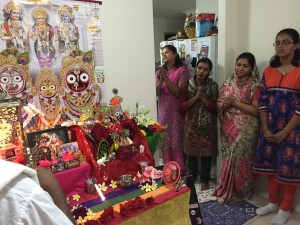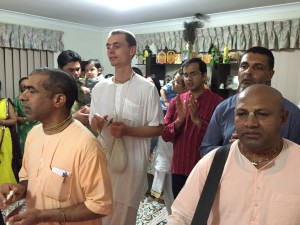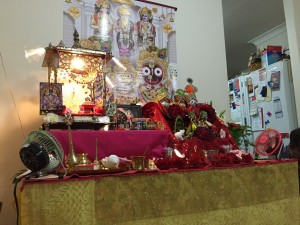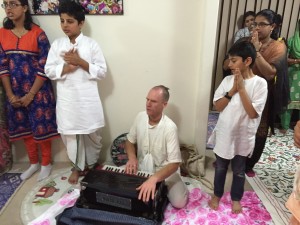
Does the small group in ISKCON serve the local temple, or does the temple serve the small group? Who serves whom?
It’s a question that’s often asked in organisations, especially in charities or campaigning groups: Does the local branch of a charity serve the national office, or does national office serve the branch? Do finances and resources flow from the branches back up to the head office, or from head office down to the branches?
In many organisations that are not functioning all that well, there will be complaints about head office by the branches, while head office will complain that the branches don’t seem to be performing well. Who is right?
The answer lies in the organic way that organisations grow, and the very word “branch” provides a clue to the answer. Back in the days when our English language employed more colourful expressions drawn from nature, we used to favourably compare organisations to trees.
The reason is of course, because when people agree to work together and function as one unit, they do grow like trees. They grow from a single idea – a seed – by a passionately committed individual; the intensely focused dedication of early co-workers, and, when successful, they grow up straight and strong, producing many branches.
Yet although the trunk of a tree, being the biggest, looks the strongest part, it can only remain strong if all of the trees smallest parts, the leaves, are also doing their job.
How a tree works is ingenious. The leaves of the tree trap the energy of sunlight with their green chlorophyll, and the astonishing process of photosynthesis then transforms water and carbon dioxide into carbohydrates and oxygen that pass down into the trunk. Invigorated by this, the trunk soaks up water and sends it back up to the leaves. Every part of the tree is working and the entire structure is functional. It continues to grow.
If the trunk doesn’t do the big stuff, like raising water from deep underground all the way up to the top of the tree sometimes fifty or more feet in the air, the tree will die. And if the leaves don’t do their sunlight catching, the tree will also die. The trunk serves the leaves and the leaves serve the trunk. Biological symbiosis makes a completely functional system.
Any organisation with many branches functions like this. That is, any functional, growing, balanced organisation.
The original roots of an organisation – the regional headquarters or a national office – serve its branches and the branches serve the head office, or in our case the head temple or national ISKCON structure.
If the head office provides nothing for the branches, they become weak and stop growing. If the branches provide nothing for head office it also becomes weak, or in many cases, begins to conserve valuable resources for itself. It gets weak all the same; it just takes a little more time. Only by each part of an organisation performing mutual service for the other parts can natural growth happen.
How do they work together?
Every organisation is different of course. There are those that are very ‘Trunk and Roots’ orientated. The branches simply serve as agents to collect money for the big stuff that is conceived and executed from head office. Many charities work that way. Oxfam, Greenpeace, Amnesty International, the Red Cross, all operate with their numerous branches raising funds which are sent to a head office that makes campaign decisions and then disburses the funds accordingly. Religions can be like that too. All decrees, innovations, directives and appointments come from a supreme governing body, and funds flow from the supporters in the branches to a central body from where they are apportioned and disbursed.
Other organisations have a very small head office and leave it up to the branches to be innovative, self-funding and locally directed. Some religions function like this too. They expect their branches to run on enthusiasm, to be self-sustaining, and to have a wide spectrum of theological understanding.
Observers comment that these different styles of religious organisation suit different types of people. Each has inherent strengths and weaknesses.
Our question, as followers of Srila Prabhupada is: “What kind of organisational structure did Srila Prabhupada want? Luckily for us, Srila Prabhupada was an extremely intelligent organiser as well as a scholar and a saint.
His many instructions for running ISKCON are well documented and were put into effect even in the early years of the movement. He considered that “organisation and intelligence” would preserve the movement he’d started, and that these two essentials, as well as spiritual strength resulting from: ‘rising up from sleep before four in the morning, chanting sixteen rounds of the Hare Krishna mantra, gorgeous deity worship, going out on the sankirtan party, holding festivals and scrutinisingly studying and discussing my books’.
Srila Prabhupada not only translated the scriptures from Sanskrit into English for the first time in history, and travelled constantly guiding his early followers; he managed all the affairs of his movement through correspondence and telegrams. So ISKCON functions with balance between trunk and branch, with a good deal of regular reciprocity between them, yet tending towards complete autonomy for the branch when it reaches the level of ‘ISKCON centre’.
Yet for each group to prosper, it is essential for it to have a great deal of spiritual nourishment flowing up from the trunk of the ISKCON tree. Preachers, teachers, book distribution, local festivals and good advice in both personal spiritual practise and outreach activities, will all help the group members, and through this the group will grow strong.
The group leader can invite preachers to come until the group members themselves are knowledgeable and proficient enough to conduct the courses that are recommended for a good understanding of Srila Prabhupada’s books. Some funding is required for this, but if each member can contribute to the transport cost of the preacher this will be very helpful.
(Taken from The ISKCON Small Groups Handbook)


























